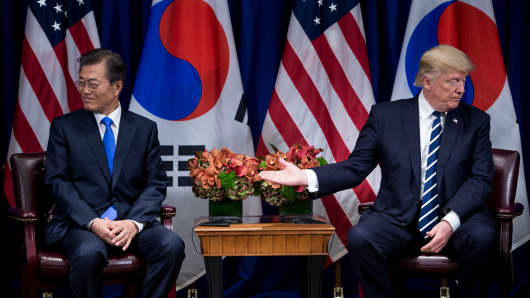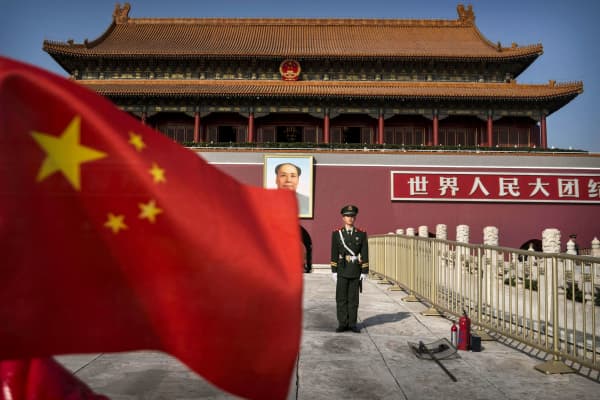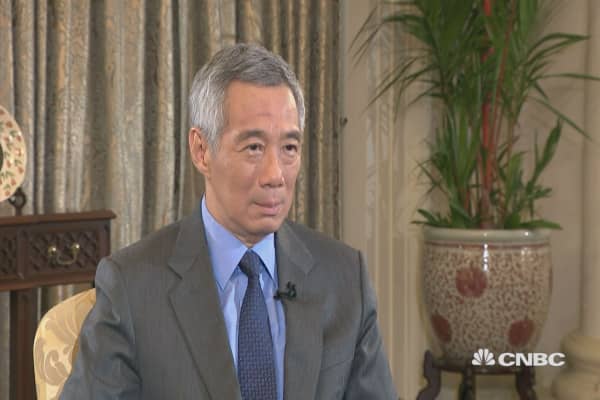A critical US ally is feeling left out, and Trump has a chance to fix things
- President Donald Trump should follow four key principles when he visits Seoul next week, experts said
- The bilateral relationship has been on shaky ground in recent months as some South Koreans feel like their country has been sidelined during the North Korea crisis
The U.S.-South Korea relationship has been on shaky footing as both nations espouse different views on reigning in a belligerent Pyongyang. At a time of heightened alarm on the Korean Peninsula, President Donald Trump has a chance to strengthen the 67 year-old military alliance when he visits Seoul in a week.
His trip will be especially vital in rectifying the sense of exclusion felt by both officials and civilians in Asia's fourth-largest economy.
Many South Koreans feel their country has been sidelined during the North Korea crisis — an idea that domestic media has dubbed "Korean passing." News outlets regularly point out how Trump's engagement with Seoul on the issue pales in comparison to his relationship with Tokyo, reflected by the frequency and intensity of phone conversations with leaders of both countries.

BRENDAN SMIALOWSKI/AFP/Getty Images
President Donald Trump gestures to South Korean President Moon Jae-in during the 72nd United Nations General Assembly on September 21, 2017.
Japanese Prime Minister Shinzo Abe shares Trump's hard-line stanceon tackling Pyongyang, while South Korean President Moon Jae-in has a toned-down approach of engagement.
"Korea passing is a genuine concern," said Robert Kelly, associate professor at Pusan National University, noting that Moon's critics often use it against him. "It is clearly the case that Trump and his flamboyant style have taken over the North Korea debate in 2017 and pushed Seoul aside. I would be worried if I were the South Koreans."
Some in South Korea even fear that a major provocation from their northern neighbor could result in Washington staging unilateral military operations. In response to Trump's "fire and fury" threat against dictator Kim Jong Un, Moon warned in August that "no one should be allowed to decide on a military action on the Korean Peninsula without South Korean agreement."
Further exacerbating the matter is the fact that the White House still hasn't nominated an ambassador to South Korea, a position that's been vacant since Trump took office in January.
To strengthen the bilateral alliance, there are four key principles the U.S. leader must follow when he meets Moon on Nov. 7, experts said.
Present a united front
Trump "must convincingly reassure President Moon and the South Korean public that the United States and South Korea are in lockstep on the North Korea issue," Jung H. Pak, senior fellow at the Brookings Institution's Center for East Asia Policy Studies, said in a recent note. "There must be no daylight between the two leaders."
In September, Trump rebuked Moon's policy of outreach with Pyongyang.
South Korea is finding, as I have told them, that their talk of appeasement with North Korea will not work, they only understand one thing!
"From the standpoint of both alliance management and of showing the North Korean regime that they cannot drive a wedge between the two allies, it is essential to present a united front," said Daniel Sneider, visiting scholar at Stanford University's Walter H. Shorenstein Asia-Pacific Research Center.
Seoul and Washington may share fundamental differences on strategies, but the two are on the same page when it comes to the underlying goals of denuclearization and standing up to Kim's threats, Sneider noted.
Place Tokyo and Seoul on equal footing
Trump's Asia tour will see him spend two days each in Japan, Vietnamand the Philippines but only one day in South Korea. That could further heighten the sentiment of neglect in Seoul. "Koreans tend to get exercised about these things, particularly the Korean media," Sneider said.
White House officials should ensure parity in Trump's trips, Pak said: "That means don't spend one day in Seoul if you're going to spend two days in Tokyo."
But Kelly of Pusan National University warned against reading too much into the situation, calling it more of a scheduling issue than anything else.
Stress a combined defense network
South Korea is a non-nuclear state, but talk of nuclear armament has been high amid the North's increased missile launches.
Last month, South Korean Defense Minister Song Young-moo and U.S. Secretary of Defense James Mattis discussed the prospect of returning American tactical nuclear weapons to South Korean soil. Washington had stationed weapons there in 1958 but withdrew them in 1991.
Meanwhile, a recent Gallup poll indicated nearly 60 percent of South Koreans supported national development of nuclear weapons, local media reported.
Meanwhile, a recent Gallup poll indicated nearly 60 percent of South Koreans supported national development of nuclear weapons, local media reported.
Both scenarios are seen as dangerous and high risk so Trump may wish to reiterate America's military support.
"As the [recent] visit of Defense Secretary Mattis made clear, it is vital that the U.S. guarantees of extended deterrence be credible and visible," said Sneider, referring to the American policy that it will defend Seoul under all circumstances.
Moon has played down calls for a return of U.S. tactical weapons and independent nuclear capabilities so by highlighting joint defense, Trump will be supporting Moon, said Pak.
Don't bring up the free trade agreement
Trump has threatened to withdraw from the United States–Korea Free Trade Agreement and repeatedly criticized the five year-old pact during Moon's first visit stateside earlier this year.
That "unnecessarily created an appearance of frosty ties, even as the North Korea threat loomed," Pak said. If Trump must bring up the deal in Seoul, "then do so quietly," she continued.
Sneider, on the other hand, said he saw no reason for Trump to take up the issue in any way: "I hope the President does not focus on this."
WATCH: President Trump will not visit DMZ on Asia trip
Nyshka ChandranReporter, CNBC Asia-Pacific


